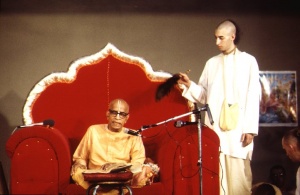SB 3.29.34: Difference between revisions
m (1 revision(s)) |
No edit summary |
||
| Line 1: | Line 1: | ||
{{info | {{info | ||
|speaker=Lord Kapiladeva the Supreme Personaliy of Godhead | |speaker=Lord Kapiladeva the Supreme Personaliy of Godhead | ||
|listener=Devahūti, mother of Lord Kapiladeva | |listener=Devahūti, mother of Lord Kapiladeva | ||
}} | }} | ||
[[Category:Srimad-Bhagavatam - Canto 03 Chapter 29]] | |||
[[Category:Bhagavatam Verses Spoken by Lord Kapila - Vanisource|032934]] | |||
<div style="float:left">'''[[Srimad-Bhagavatam]] - [[SB 3|Third Canto]] - [[SB 3.29: Explanation of Devotional Service by Lord Kapila|Chapter 29: Explanation of Devotional Service by Lord Kapila]]'''</div> | |||
<div style="float:right">[[File:Go-previous.png|link=SB 3.29.33]] '''[[SB 3.29.33]] - [[SB 3.29.35]]''' [[File:Go-next.png|link=SB 3.29.35]]</div> | |||
{{RandomImage}} | |||
==== TEXT 34 ==== | ==== TEXT 34 ==== | ||
<div | <div class="verse"> | ||
manasaitāni bhūtāni | :manasaitāni bhūtāni | ||
praṇamed bahu-mānayan | :praṇamed bahu-mānayan | ||
īśvaro jīva-kalayā | :īśvaro jīva-kalayā | ||
praviṣṭo bhagavān iti | :praviṣṭo bhagavān iti | ||
</div> | </div> | ||
| Line 16: | Line 22: | ||
==== SYNONYMS ==== | ==== SYNONYMS ==== | ||
<div | <div class="synonyms"> | ||
''manasā''—with the mind; ''etāni''—to these; ''bhūtāni''—living entities; ''praṇamet''—he offers respects; ''bahu-mānayan''—showing regard; ''īśvaraḥ''—the controller; ''jīva''—of the living entities; ''kalayā''—by His expansion as the Supersoul; ''praviṣṭaḥ''—has entered; ''bhagavān''—the Supreme Personality of Godhead; ''iti''—thus. | |||
</div> | </div> | ||
| Line 23: | Line 29: | ||
==== TRANSLATION ==== | ==== TRANSLATION ==== | ||
<div | <div class="translation"> | ||
Such a perfect devotee offers respects to every living entity because he is under the firm conviction that the Supreme Personality of Godhead has entered the body of every living entity as the Supersoul, or controller. | Such a perfect devotee offers respects to every living entity because he is under the firm conviction that the Supreme Personality of Godhead has entered the body of every living entity as the Supersoul, or controller. | ||
</div> | </div> | ||
| Line 30: | Line 36: | ||
==== PURPORT ==== | ==== PURPORT ==== | ||
<div | <div class="purport"> | ||
A perfect devotee, as described above, does not make the mistake of thinking that because the Supreme Personality of Godhead as Paramātmā has entered into the body of every living entity, every living entity has become the Supreme Personality of Godhead. This is foolishness. Suppose a person enters into a room; that does not mean that the room has become that person. Similarly, that the Supreme Lord has entered into each of the 8,400,000 particular types of material bodies does not mean that each of these bodies has become the Supreme Lord. Because the Supreme Lord is present, however, a pure devotee accepts each body as the temple of the Lord, and since the devotee offers respect to such temples in full knowledge, he gives respect to every living entity in relationship with the Lord. Māyāvādī philosophers wrongly think that because the Supreme Person has entered the body of a poor man, the Supreme Lord has become daridra-nārāyaṇa, or poor Nārāyaṇa. These are all blasphemous statements of atheists and nondevotees. | A perfect devotee, as described above, does not make the mistake of thinking that because the Supreme Personality of Godhead as Paramātmā has entered into the body of every living entity, every living entity has become the Supreme Personality of Godhead. This is foolishness. Suppose a person enters into a room; that does not mean that the room has become that person. Similarly, that the Supreme Lord has entered into each of the 8,400,000 particular types of material bodies does not mean that each of these bodies has become the Supreme Lord. Because the Supreme Lord is present, however, a pure devotee accepts each body as the temple of the Lord, and since the devotee offers respect to such temples in full knowledge, he gives respect to every living entity in relationship with the Lord. Māyāvādī philosophers wrongly think that because the Supreme Person has entered the body of a poor man, the Supreme Lord has become ''daridra-nārāyaṇa'', or poor Nārāyaṇa. These are all blasphemous statements of atheists and nondevotees. | ||
</div> | </div> | ||
__NOTOC__ | |||
<div style="float:right; clear:both;">[[File:Go-previous.png|link=SB 3.29.33]] '''[[SB 3.29.33]] - [[SB 3.29.35]]''' [[File:Go-next.png|link=SB 3.29.35]]</div> | |||
__NOTOC__ | |||
__NOEDITSECTION__ | |||
Revision as of 16:57, 9 May 2021

A.C. Bhaktivedanta Swami Prabhupada
TEXT 34
- manasaitāni bhūtāni
- praṇamed bahu-mānayan
- īśvaro jīva-kalayā
- praviṣṭo bhagavān iti
SYNONYMS
manasā—with the mind; etāni—to these; bhūtāni—living entities; praṇamet—he offers respects; bahu-mānayan—showing regard; īśvaraḥ—the controller; jīva—of the living entities; kalayā—by His expansion as the Supersoul; praviṣṭaḥ—has entered; bhagavān—the Supreme Personality of Godhead; iti—thus.
TRANSLATION
Such a perfect devotee offers respects to every living entity because he is under the firm conviction that the Supreme Personality of Godhead has entered the body of every living entity as the Supersoul, or controller.
PURPORT
A perfect devotee, as described above, does not make the mistake of thinking that because the Supreme Personality of Godhead as Paramātmā has entered into the body of every living entity, every living entity has become the Supreme Personality of Godhead. This is foolishness. Suppose a person enters into a room; that does not mean that the room has become that person. Similarly, that the Supreme Lord has entered into each of the 8,400,000 particular types of material bodies does not mean that each of these bodies has become the Supreme Lord. Because the Supreme Lord is present, however, a pure devotee accepts each body as the temple of the Lord, and since the devotee offers respect to such temples in full knowledge, he gives respect to every living entity in relationship with the Lord. Māyāvādī philosophers wrongly think that because the Supreme Person has entered the body of a poor man, the Supreme Lord has become daridra-nārāyaṇa, or poor Nārāyaṇa. These are all blasphemous statements of atheists and nondevotees.